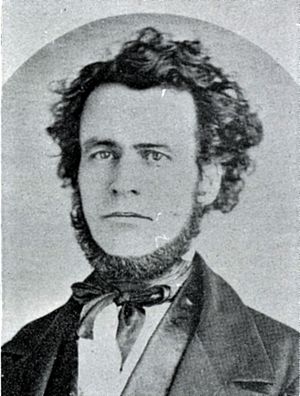Samuel Thurston facts for kids
Quick facts for kids
Samuel Thurston
|
|
|---|---|
 |
|
| Delegate to the U.S. House of Representatives from the Oregon Territory's at-large district |
|
| In office December 3, 1849 – March 3, 1851 |
|
| Preceded by | Constituency established |
| Succeeded by | Joseph Lane |
| Personal details | |
| Born |
Samuel Royal Thurston
April 15, 1816 Monmouth, Maine, U.S. |
| Died | April 6, 1851 (aged 34) At sea off Acapulco, Mexico |
| Political party | Democratic |
| Education | Dartmouth College Bowdoin College (BA) |
Samuel Royal Thurston (born April 15, 1816 – died April 9, 1851) was an important American pioneer, lawyer, and politician. He was the very first person to represent the Oregon Territory in the United States Congress. He played a big part in creating the Donation Land Claim Act, which helped people get land in Oregon.
Contents
About Samuel Thurston
His Early Life and Education
Samuel Thurston was born in Monmouth, Maine. He grew up in Peru, Maine, and his father passed away when Samuel was young. He went to Dartmouth College and then graduated with honors from Bowdoin College in Maine in 1843. After college, he studied law and became a lawyer. He then got married and moved with his wife to Iowa.
In 1847, Thurston traveled to the Oregon Country along the famous Oregon Trail. He settled in Hillsboro and started his law practice there. In 1848, he was chosen to be part of the Provisional Legislature for the Tuality District (now Washington County).
His Time in Politics
As a politician, Samuel Thurston was involved in how land was given out in Oregon. He worked with Jason Lee against John McLoughlin, who was in charge of the Hudson's Bay Company at Fort Vancouver. Thurston believed that McLoughlin was making it harder for new settlers to claim land. As Oregon's delegate to Congress, Thurston helped write the Donation Land Claim Act. This act aimed to make sure that McLoughlin's large land claim would go to the state, not to him personally. Thurston made strong arguments against McLoughlin's land claims, which led to McLoughlin losing his land in Oregon City.
Thurston's biggest success in politics was helping to pass the Donation Land Claim Act in 1850. This law made it legal for people who were already living on land in the Oregon Territory to officially claim it. It also gave 640 acres (about 2.6 square kilometers) to each married couple who agreed to settle and farm the land for four years. This act was an early version of the later Homestead Act of 1862.
In 1850, Thurston also wrote to Congress to support a ban on free African-Americans living in the Oregon Territory. He argued that allowing them to settle would lead to problems and conflicts with Native American tribes. He believed this policy was necessary for the safety of white settlers in Oregon.
Along with Joseph Lane, Thurston also helped stop the approval of the Tansy Point Treaty in 1851. This treaty was about land belonging to the Clatsop and Nehalem tribes along the Oregon Coast. Because the treaty was not approved, these tribes faced ongoing legal issues regarding their land.
His Death and What He Left Behind
Samuel Thurston was returning to Oregon by way of Panama when he became sick with a tropical fever. He passed away on April 9, 1851, while on a ship called the California, near Acapulco, Mexico. His body was first buried in Acapulco. However, two years later, the Oregon Legislature arranged for his remains to be brought back to Oregon.
He was reburied in the Salem Pioneer Cemetery in Salem. His gravestone says: "Here rests Oregon's first delegate, a man of genius and learning. A lawyer and statesman. His devotions equaled his wide philanthropy, his public acts are his best eulogium."
Thurston County, Washington, which was once part of the Oregon Territory, was named in his honor. The capital of Washington, Olympia, is located in Thurston County.
 | DeHart Hubbard |
 | Wilma Rudolph |
 | Jesse Owens |
 | Jackie Joyner-Kersee |
 | Major Taylor |

